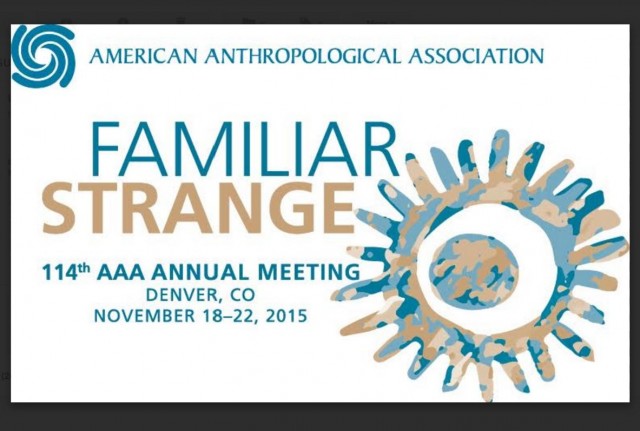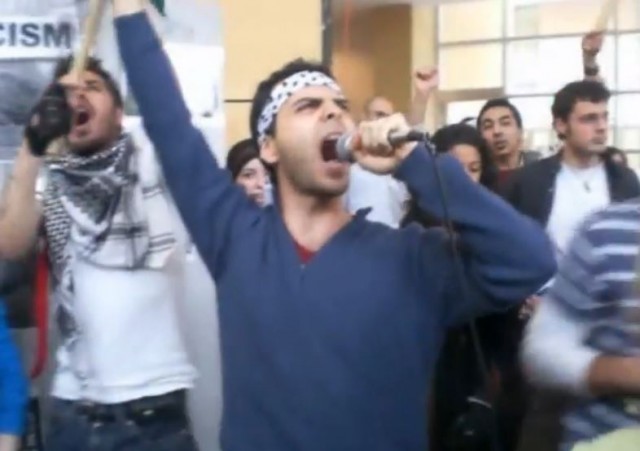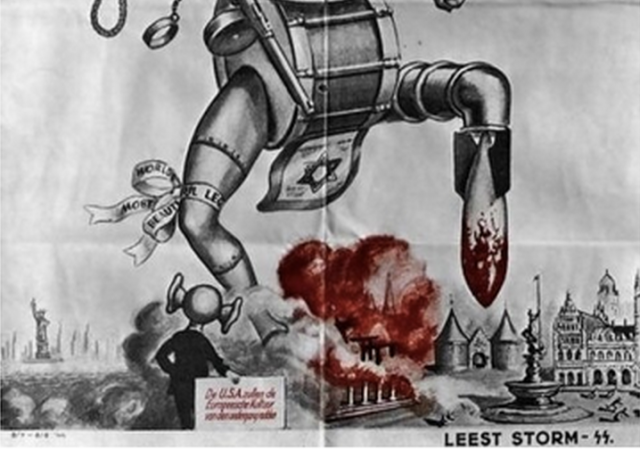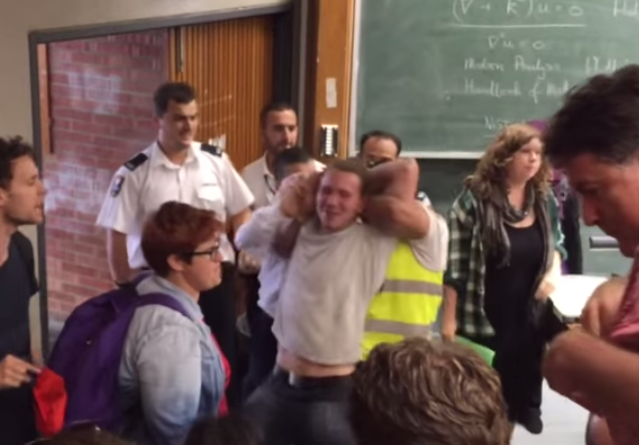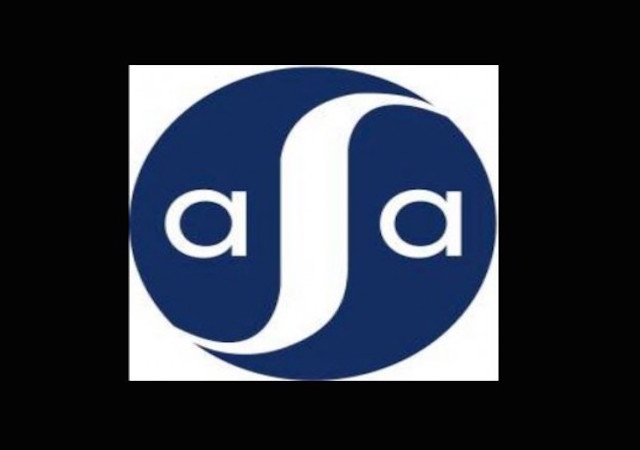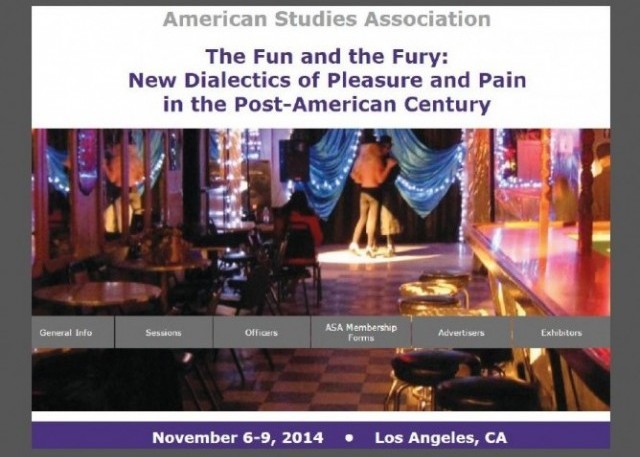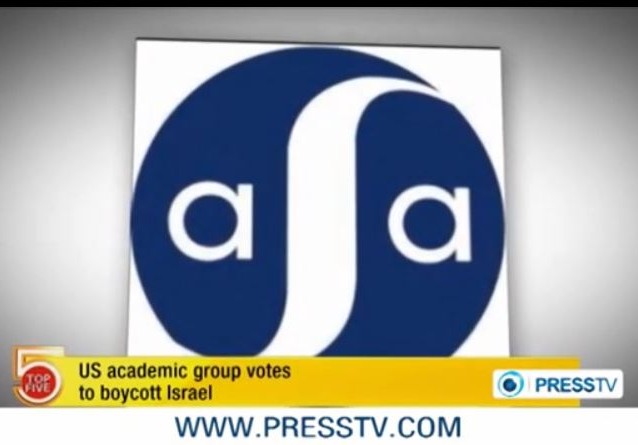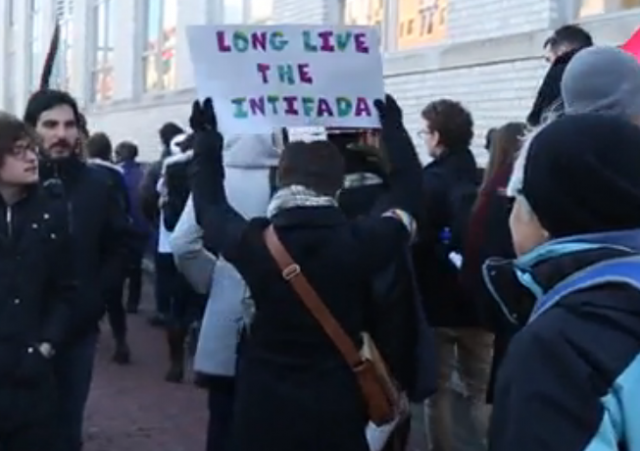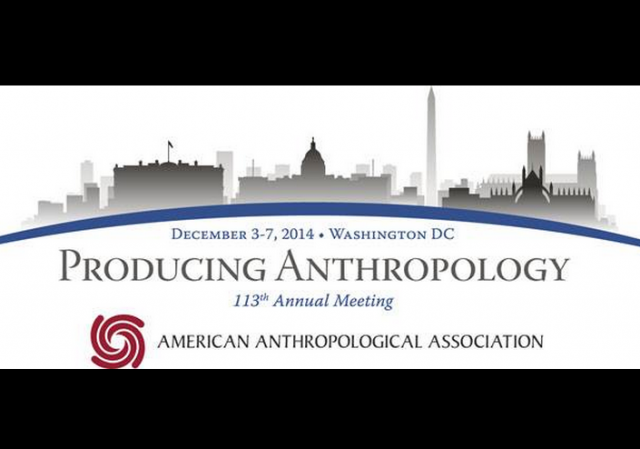American Studies Association Tag
American Anthropological Association facing self-destructive BDS resolution
... We found the “settler colonialism” frame suggested by many of our interlocutors to capture some aspects of the relationship of the Israeli government to Palestinians that concerned us and we present that frame first....
Anti-Israel campus bullies demand Freedom from Criticism
Revisiting the ugly Vassar College anti-Israel academic boycott
- Anti-Israel “Climate of fear” at Vassar
- No takers on my debate challenge to Vassar pro-boycott faculty, but I’m still going
- Anti-Israel Vassar student group focuses on race of crowd at my speech
- “One responded, actually calling for a boycott of Professor Jacobson”
- Vassar President condemns “racist, anti-Semitic graphic” posted by Students for Justice in Palestine
- Vassar removes Wall of Truth raised to protest anti-Israel campus climate (Updates)
- NY Daily News Editorial: “Vile at Vassar”
- Pro-Israel Muslim Vassar student’s lonely fight to defend Israel
Anti-Israel profs helped deal BDS its biggest blow yet
House Resolution introduced condemning academic boycott of Israel
Anti-Israel boycotters tighten grip on American Studies Association
American Historical Association rejects anti-Israel Resolutions
Intolerance for dissenting boycott views at American Studies annual meeting
It was just the first day of the American Studies Association’s annual meeting here Thursday, but tensions surrounding the organization’s year-old academic boycott of Israel were already flaring. The flashpoint was an anti-boycott panel that sought to explore such questions as the role of political ideology in academic debate, whether the Israel-Palestine conflict is within the purview of the ASA, and whether academic boycotts are a legitimate means to political ends. But while some attendees said they appreciated the panelists' thoughts, others accused them of perpetuating a “for” or “against” line of thinking they said has done irreparable damage to the discipline.
Hotels must say “NO” to anti-Israeli discrimination at academic conferences
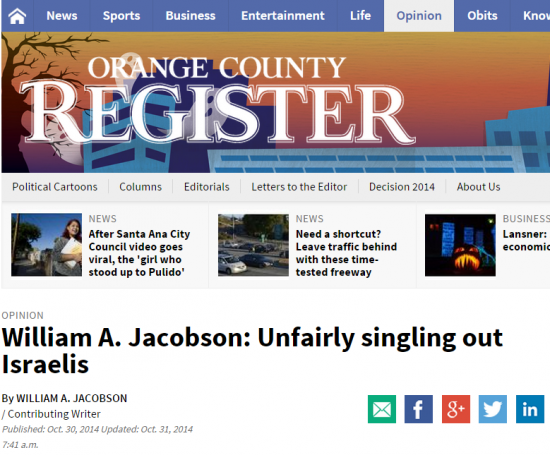 Here is an excerpt:
Here is an excerpt:
American Studies Association walks back anti-Israel boycott (but damage is done)
Ever since I started covering the anti-Israel academic boycott of the American Studies Association in December 2013, I have interacted with some of its members who are reasonable people concerned about the direction the ASA has taken. But those voices have been drowned out by a shrill and vocal minority.
A little publicized fact is that less than one quarter of the membership voted in favor of the boycott (and depending on which membership numbers you use, perhaps as few as 16%), but it was enough to change the course of the organization due to low overall participation.
Once known as a somewhat obscure but well-regarded organization, ASA now is a pariah (as the NY Times described it) because of the boycott. ASA has become the poster child for how a relatively small group of anti-Israel radicals can take over key committees of a relatively small organization and leverage that power for a political agenda.
In this case, the agenda is the Boycott, Divest and Sanction movement, conceived of and scripted at the anti-Semitic 2001 Durban conference. Part of the Durban script was to have Palestinian civil groups issue a call for a boycott. That took place, and now groups like ASA cite the civil call for a boycott as their justification, ignoring its roots and preplanning.
At a time when the Humanities and Social Sciences are suffering and Ph.D. graduate students in fields like American Studies have few job prospects, the leadership and activists at ASA devote their energies to demonizing and delegitimizing Israel.
During this year's annual meeting, an entire day will be devoted to an offsite program run by ASA's Activism Caucus (yes, there really is such a thing) to teach faculty from around the country how to boycott Israeli universities, faculty, and scholars. ASA in a real sense has become a political activist organization.
The boycott, as applied to ASA's annual meeting, was discriminatory, and the hotel was put on notice that the hotel had potential liability.
Academic boycott busted — American Studies Assoc backs off anti-Israel conference rules
Our resolution understands boycott as limited to a refusal on the part of the Association in its official capacities to enter into formal collaborations with Israeli academic institutions, or with scholars who are expressly serving as representatives or ambassadors of those institutions, or on behalf of the Israeli government ....That is a distinction ASA made throughout its public statements and position papers -- if you were a representative of an Israeli institution, or if you had an administrative title, you were boycotted. For example, a form letter ASA distributed to members to be given to university administrators made the same distinction:
Will Westin Bonaventure permit anti-Israel discrimination on its premises?
Fordham Prof. faced “religious discrimination” charge for calling anti-Israel academic boycott “anti-Semitic”
The email arrived on the last Friday afternoon of the spring term shortly before 5:00 p.m. Anastasia Coleman, Fordham’s Director of Institutional Equity and Compliance, and its Title IX Coordinator, wanted to meet with me. “It has been alleged,” she wrote, “that you may have acted in an inappropriate way and possibly discriminated against another person at the University.” ... “Did it have anything to do with a student?” I shot back anxiously, hoping to get a sense of my predicament before the director left for the weekend. I was lucky. Coleman responded immediately. “This does not involve students and is about your behavior regarding American Studies.”
Over 1200 Scholars Sign Petition against Academic Boycott of Israel
 (Click on Image to go to Petition page)[/caption]
You don’t have to be “pro-Israel” to sign — only pro-academic freedom, pro-fairness, pro-intellectual honesty, pro-education and pro-peace.
Here’s an excerpt from the Petition:
(Click on Image to go to Petition page)[/caption]
You don’t have to be “pro-Israel” to sign — only pro-academic freedom, pro-fairness, pro-intellectual honesty, pro-education and pro-peace.
Here’s an excerpt from the Petition:
BDS hate on campus is real
Anti-Israel academic boycotters rig debate at American Anthropological Association
Sign Petition Against Academic Boycott of Israel (Update – 900+)
 (Click on Image to go to Petition page)[/caption]
You don't have to be "pro-Israel" to sign. You only need to be pro-academic freedom, pro-fairness, pro-intellectual honesty, pro-education and pro-peace.
The Petition quietly went live online last week, and already has over 500 signatures, including some very prominent academics from a wide variety of academic disciplines: International Petition to Oppose Boycotts of Israel's Academic Institutions, Scholars and Students.
Legal Insurrection reader crowdsourcing was critical in responding to the ASA boycott. We can do it again by spreading the word as to the Petition on Facebook, Twitter and by personal contacts.
Here's an excerpt from the Petition:
(Click on Image to go to Petition page)[/caption]
You don't have to be "pro-Israel" to sign. You only need to be pro-academic freedom, pro-fairness, pro-intellectual honesty, pro-education and pro-peace.
The Petition quietly went live online last week, and already has over 500 signatures, including some very prominent academics from a wide variety of academic disciplines: International Petition to Oppose Boycotts of Israel's Academic Institutions, Scholars and Students.
Legal Insurrection reader crowdsourcing was critical in responding to the ASA boycott. We can do it again by spreading the word as to the Petition on Facebook, Twitter and by personal contacts.
Here's an excerpt from the Petition:
Donations tax deductible
to the full extent allowed by law.
CONTRIBUTORS
- William A. Jacobson
Founder
- Kemberlee Kaye
Sr. Contrib Editor
- Mary Chastain
Contrib Editor
- Mike LaChance
Higher Ed
- Leslie Eastman
Author
- Vijeta Uniyal
Author
- Stacey Matthews
Author
- Jane Coleman
Author
- Ben Smith
Weekend Editor
- Elizabeth Stauffer
Author
- Mandy Nagy
Editor Emerita
- Learn more about the Contributors



